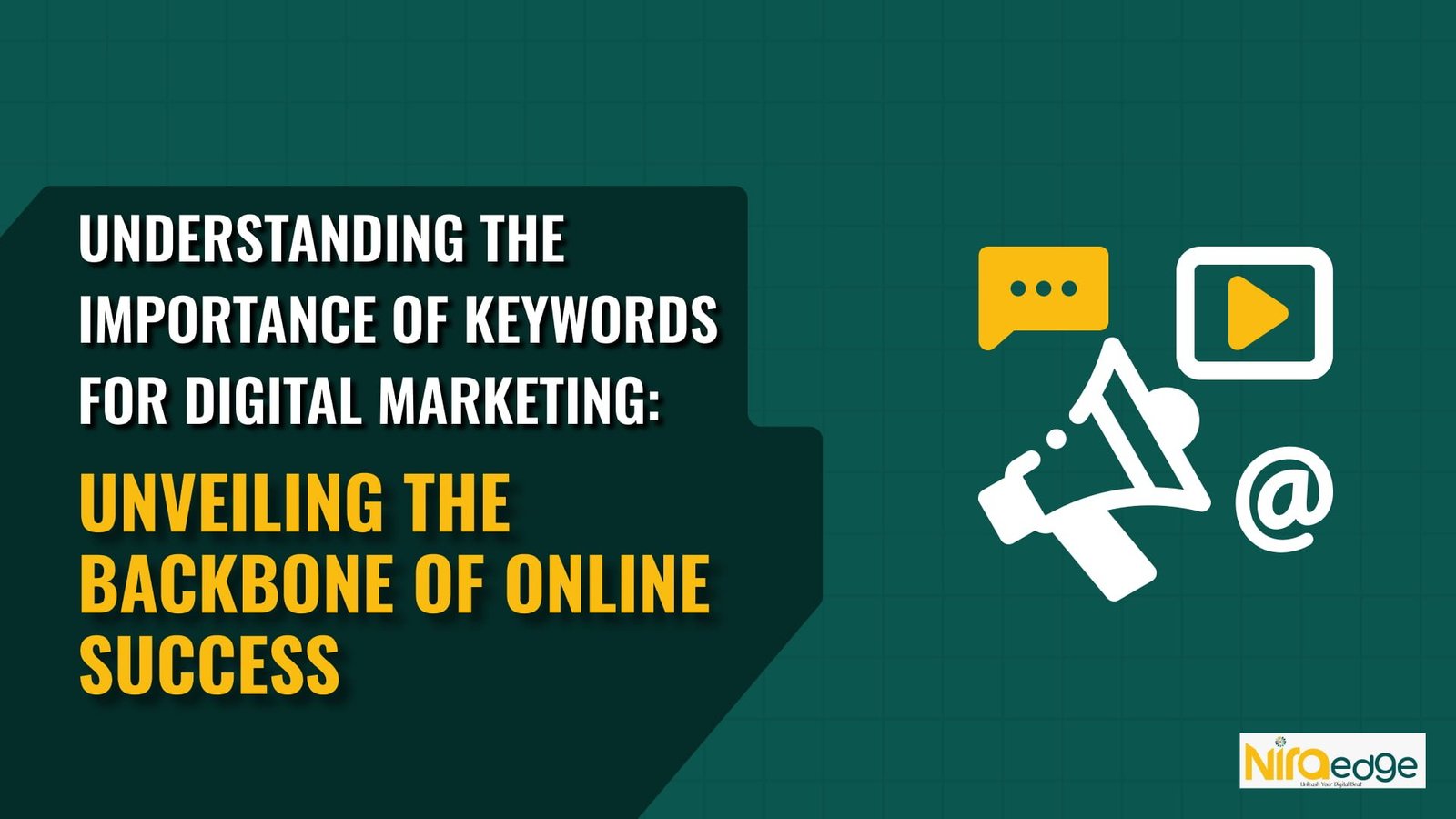
Understanding The Importance Of Keywords For Digital Marketing: Unveiling the Backbone of Online Success
- Nira Edge
- August 23, 2023
- Blog, Digital Marketing, Marketing, PPc, SEO, SEO Optimization
- Business, Content marketing, Digital, digital marketing, SEO, SEO Optimization
- 0 Comments
SEO Meta Description
Explore the pivotal role of keywords in digital marketing. Learn how strategic keyword usage can enhance online visibility, engagement, and conversions. Discover the dos and don’ts of keyword integration for effective digital marketing campaigns.
Introduction
In the ever-evolving realm of digital marketing, understanding the importance of keywords is akin to grasping the foundation of a successful online strategy. Keywords are not mere strings of text; they are the driving force behind search engine optimization (SEO) efforts, influencing your website’s visibility, engagement, and, ultimately, your business’s success.
Unveiling the Power of Keywords
Keywords, those seemingly innocent words and phrases scattered across your website’s content, hold incredible power. Users searching for information, products, or services enter specific keywords into search engines. These keywords act as bridges, connecting users to the most relevant websites. Integrating the right keywords into your content can position your website as a top choice in search results.
The Role of Keyword Research
Effective digital marketing starts with thorough keyword research. This involves identifying the words and phrases potential customers will likely use when searching for your products or services. Leveraging tools like Google Keyword Planner and SEMrush can help unearth these golden nuggets of search terms, giving you insights into your target audience’s language.
Crafting Compelling Content Around Keywords
Once you have your list of carefully selected keywords, it’s time to seamlessly weave them into your content. The key is to create high-quality, informative, and engaging content that appeals to search engines and resonates with your audience. This balance ensures that you provide value while boosting your chances of ranking higher in search results.
The Art of On-Page Optimization
On-page optimization is where keywords shine the brightest. From incorporating keywords in titles, headings, and meta descriptions to sprinkling them naturally throughout your content, every element plays a role in improving your website’s visibility. However, remember that keyword stuffing – excessive and unnatural keyword usage – can do more harm than good, potentially leading to penalties from search engines.
LSI Keywords: Expanding Your Reach
Latent Semantic Indexing (LSI) keywords are the secret sauce that adds depth to your content. These are terms related to your primary keywords and help search engines better understand your content’s context. For instance, if your main keyword is “digital marketing,” LSI keywords could include “SEO,” “content strategy,” and “online advertising.”
Navigating the World of Long-Tail Keywords
Long-tail keywords are longer, more specific phrases that cater to highly targeted searches. While they may have lower search volume, they often yield higher conversion rates. For instance, “best affordable digital marketing courses” is more precise than “digital marketing courses.” Combining long-tail and short-tail keywords can yield a well-rounded SEO strategy.
Mobile Optimization and Voice Search Compatibility
As mobile devices and voice assistants become integral to our lives, keyword strategies must evolve. People search differently when speaking than typing, so incorporating conversational and location-specific keywords can optimize your content for voice search. Additionally, ensure your website is mobile-friendly to effectively capture the growing mobile user base.
The SEO Landscape: Adapting to Algorithm Changes
Search engines constantly refine their algorithms to provide users with the best results. Staying updated with these changes is crucial. Regularly monitoring your keyword performance, keeping an eye on competitors’ strategies, and adjusting your content accordingly can help you stay ahead in the ever-changing SEO landscape.
Understanding User Intent and Keywords
Catering to user intent is at the heart of practical keyword usage. Google’s algorithms prioritize delivering content that matches user intent. This means more is needed to incorporate keywords; you must also ensure your content satisfies the user’s search intent. Are they looking for information, a solution, or ready to purchase?
Embracing Multichannel Marketing
Keywords don’t just belong on your website; they’re integral to your entire online presence. From social media profiles to YouTube video descriptions, keywords make your content discoverable across various platforms. Consistency in keyword usage and branding enhances your visibility and helps users recognize your brand across channels.
Conclusion
Understanding the importance of keywords in digital marketing is like holding the key to a treasure trove of online success. You can enhance your website’s visibility, engagement, and conversions by conducting thorough research, strategically integrating keywords, and staying attuned to industry shifts. Remember, keywords aren’t just words; they’re the foundation of your online journey.
FAQs
Keyword research tools like Google Keyword Planner, SEMrush, and Ahrefs can assist in identifying relevant keywords for your industry. Additionally, analyzing competitor keywords and understanding your target audience's language is essential.
No, it's not necessary to use exact-match keywords. Search engines are becoming more brilliant at understanding synonyms and related terms. Focus on creating natural-sounding content that incorporates both primary and related keywords.
While short-tail keywords are competitive, they can yield results. However, incorporating long-tail keywords can help you target specific niches and capture users with higher purchasing intent.
Regular keyword evaluation is crucial. With evolving trends and changing user behaviour, your keyword strategy should adapt. Aim to review and update your keywords at least every few months.
Keyword density should be around 1.30%, meaning your focus keyword appears roughly 13 times per 1000 words. However, prioritize natural and reader-friendly content over strict keyword density.
If you've unintentionally engaged in keyword stuffing, editing your content is essential. Remove excessive keywords and rephrase sentences to create a more natural flow. Focus on providing value to readers.
Related Posts

- Nira Edge
- March 1, 2023
Marketing-Led Digital Transformation: Why It’s Important and How to Succeed by 2023
D Digital transformation has become a buzzword in the business world, and for a good reason. As ..

- Nira Edge
- August 15, 2023
10 Best Digital Marketing Strategies For Hotels (Ultimate Guide)
In the ever-evolving hospitality industry landscape, digital marketing has become an indispensa ..







Leave A Comment